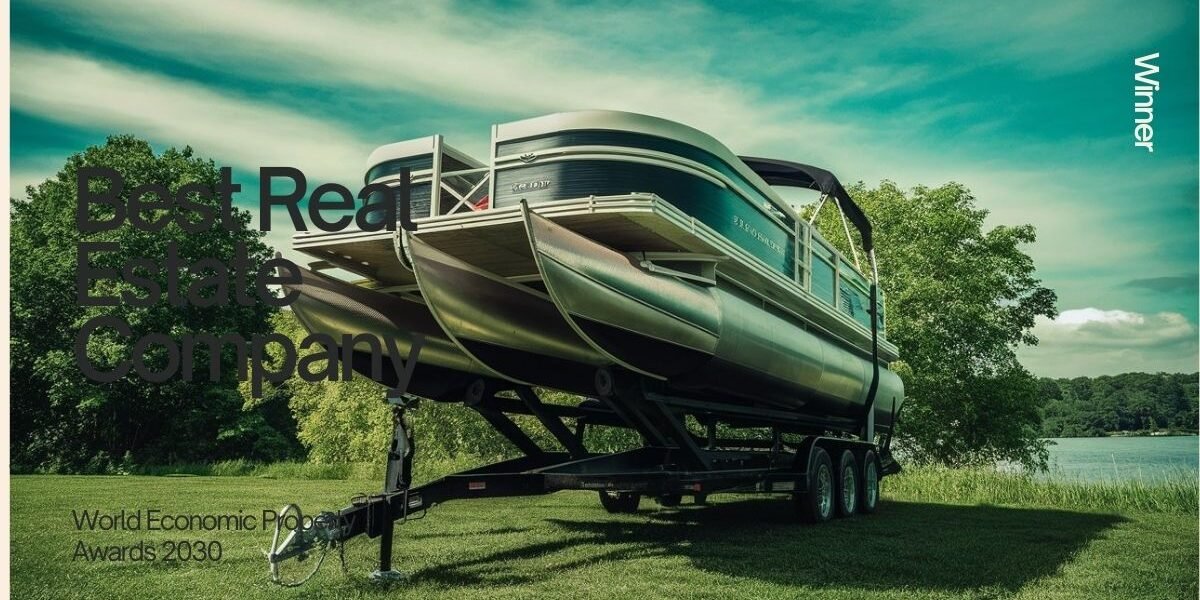Understanding the Height of a Pontoon Boat on a Trailer for Safe Transport and Storage
When it comes to understanding the height of a pontoon boat on a trailer for safe transport and storage, it’s important to consider a few key factors.
Firstly, you’ll want to take into account the size of your boat, as well as the length and height of the boat on the trailer.
This will help ensure that your boat fit securely on the trailer without any issues.
If you have a new pontoon, it’s worth investing in a pontoon trailer specifically designed for these types of boats.
Make sure the boat is sitting on the trailer properly, with the bunk-style trailer supporting the boat evenly.
Also, check the highest point on the boat, such as a bimini top, to determine the overall height of your setup.
Another important consideration is the type of trailer you have, such as a scissor trailer or an axle trailer, as this can affect the height of your boat when it’s loaded.
You’ll also want to think about the weight of the trailer and how it affects the overall height of the boat and trailer combination.
If you’re storing your boat in an RV garage, be sure to measure the height clearance to ensure your setup will fit.
Additionally, when pulling the boat, use the winch to carefully load and unload the boat on the trailer without causing any damage.
If you’re in the market for a new pontoon trailer, consider the average height of trailers for pontoons to find one that suits your needs.
A bunk trailer may be more suitable for larger boats, while a center lift trailer could be better for smaller boats.
Before buying a pontoon or a trailer, make sure to double-check the compatibility of the two to ensure a proper fit.
By taking these factors into account, you’ll be able to transport and store your pontoon boat safely and securely.
How to Properly Measure the Height of a Pontoon Boat on a Trailer
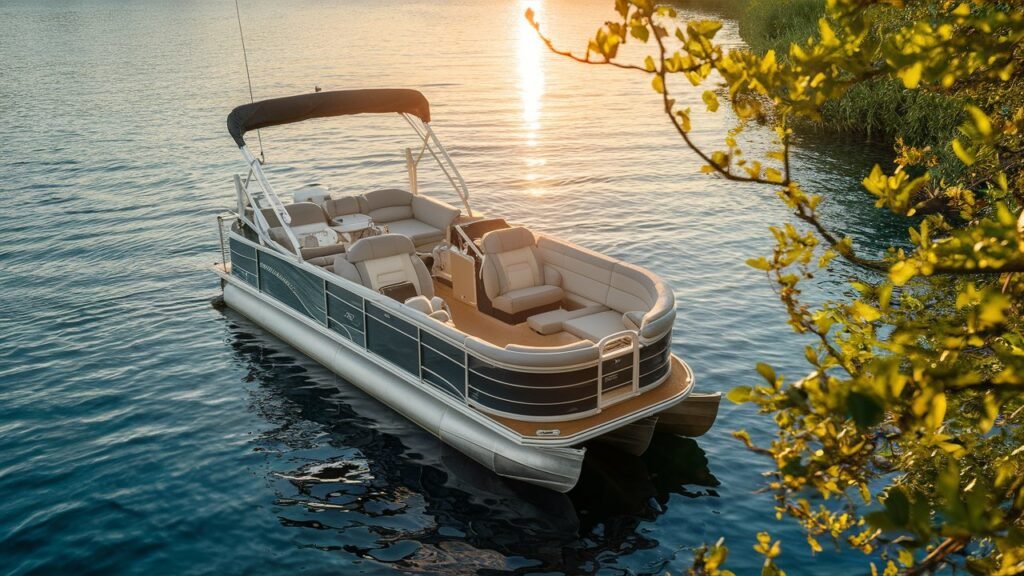
Hello pontoon possessors! Therefore, you want to guarantee that you are correctly calculating the height of your pontoon boat on a trailer, correct?
Here is what you should do.
Initially,
measure the length of your boat in order to determine whether or not you need an 8’, 8’6, or 8’6 trailer.
Subsequently,
take into consideration the width of your pontoon, including the pontoon tubes.
Consider if you have a tritoon or just a regular toon.
Make sure that the boat sits properly on top of it and check its weight as well as finding out if it can be towed by your tow vehicle for safety precautions.
Now,
let’s talk about protecting our boats.
Think about buying one where we can store ours inside too especially if we are planning on getting longer ones for garages.
Look into center lift pontoon trailers so that loading and launching at boat ramps becomes easier when using them.
Consider having tandem axle trailers because they provide smoother towing experiences while driving on roads and also add stability since they are two wheeled unlike single axles which may not distribute weight evenly
thus leading to tipsy movements along highways during windy days with high-speed limits set by authorities in various states across America like Michigan
where this law applies among other places having similar climates due to their proximity towards great lakes region located within northern parts bordering Canada being influenced mainly by maritime weather patterns originating from coastal areas along
Atlantic ocean currents flowing southwards towards Florida peninsula before turning northward supplying moisture inland causing significant amounts precipitation falling over wide areas extending eastwards up until Appalachian mountains range before curving offshore
again near Cape Hatteras resulting heavy snowfall events occurring frequently during winter months over these parts making them susceptible sub-freezing temperatures accompanied strong winds creating blizzard conditions
affecting transportation systems such as railways freezing rain leading ice accumulation thus damaging power lines causing blackouts trees falling across roads blocking traffic etcetera.
Remember to consult with different manufacturers about what will suit your trailer’s need and the pontoon itself too.
By being accurate in our measurements plus right choice of equipment, it’ll be more fun during these activities along waters!
Using a Tape Measure to Determine the Overall Height
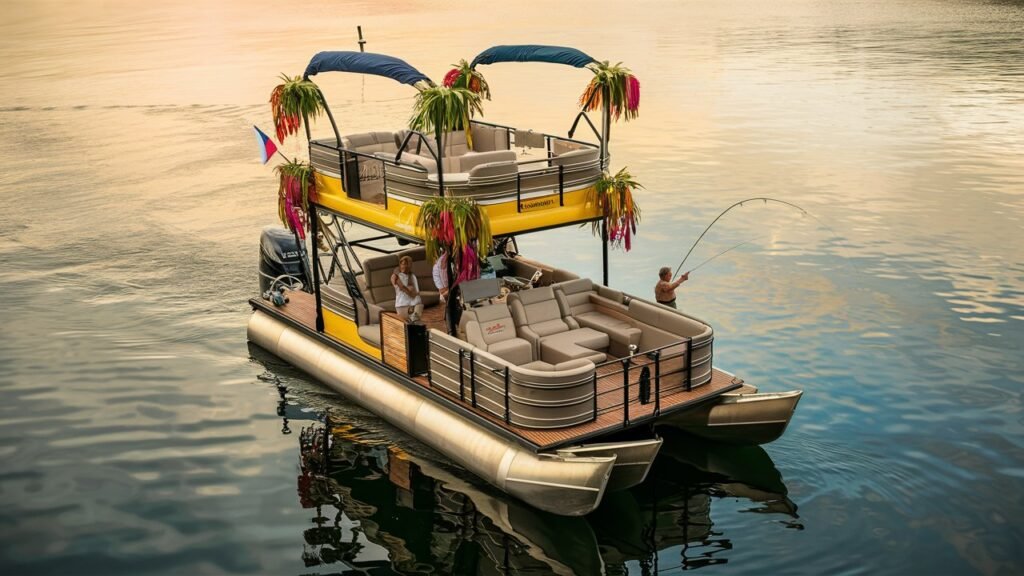
Using a Tape Measure to Determine the Overall Height
Thus, you want to determine the overall height of your boat on a trailer?
First – pick up that trusty tape measure. Measure how far the boat stretches, from the front to the back.
After that, gauge how tall it is on the trailer from bottom door to hardtop.
Also include any extras like winch stand or cruise in your measurements.
Once you have these numbers down pat, you’ll know what size pontoon boat trailer to tow with.
Don’t fret; it won’t take long for you get used to everything and be out cruising soon.
Choosing the Right Trailer for Your Pontoon Boat
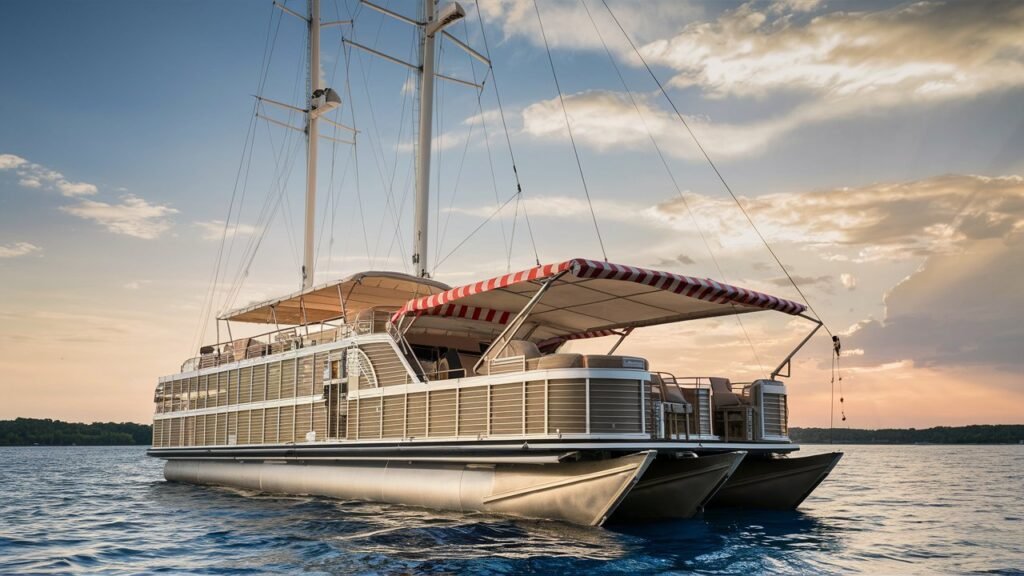
The perfect trailer for a pontoon boat can be difficult to find.
This is particularly true if the length of the boat and its height on a trailer must match perfectly to fit in an average garage with limited space.
You do not want a too big or too small trailer in accordance with your boat length.
So before you do anything else, make sure that you have enabled javascript in your browser so as to input the exact dimensions of the boat correctly.
This can help determine what size of a trailer should be used for safe and efficient towing.
Having the wrong or right one can make all difference in terms of how long it takes or how wide it is across any body of water.
Matching up different carriers’ capabilities with smoothness when impelled by corrosion resistance against which they were meant to be pulled behind also matters greatly during transport; therefore, ensure that this is taken care of well enough for easy hauling purposes along various distances covered.
Whether a pontoon boat measures 12 feet or 30 feet in length, having single axle trailers with few inches extra space will guarantee safe fitting always.
Furthermore, correct selection hereof may save one from many troubles associated with loading/unloading boats onto/off them
Understanding Different Trailer Types for Pontoons
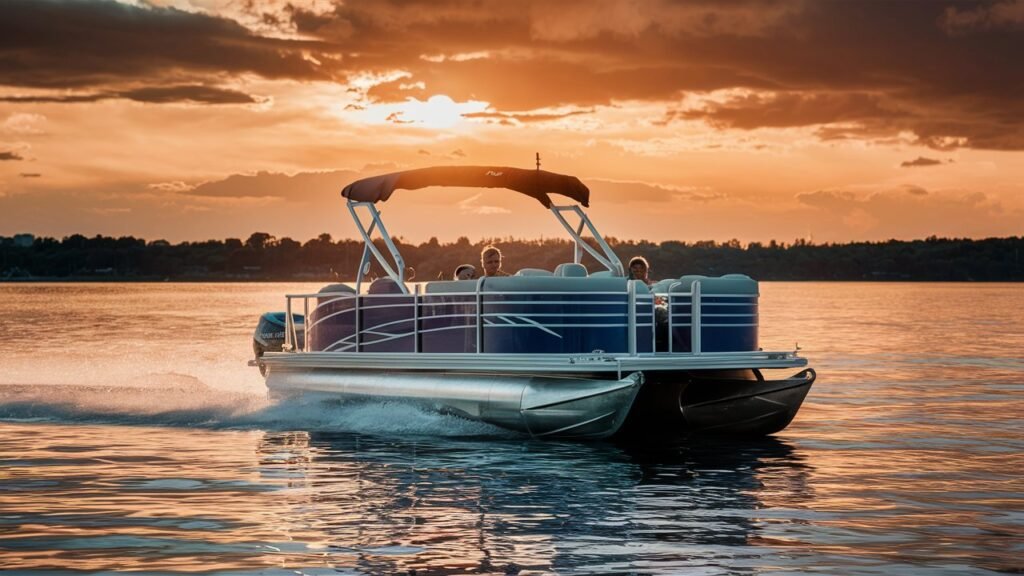
Alright, so here’s the deal – if you want to haul your boat around, you should know about different trailer types for pontoons.
First of all, the height of the boat on a trailer needs to be considered.
Ensure that your trailer matches up in size with the boat; otherwise this could lead to some problems.
Also, if you receive a notification saying javascript is disabled make sure that you enable javascript in your browser before continuing because trust me it will save you a lot of headaches.
Different sized pontoons might require different types of trailers so do some research or else smoother sailing may not be smooth at all.
If you’re going to store your boat inside somewhere don’t forget to measure the overhead door!
And if you’re planning on taking your boat long-distance, you definitely wanna make sure you have the right setup. Happy boating!
Okay, you want to pull your pontoon behind you but there are so many kinds of trailers out there it might make your head spin.
First, you need to consider the boat height on a trailer. You don’t want to drag your boat along the road and risk scratching it all up now do ya?
Also, make sure that your trailer matches up well with your boat; otherwise things could get real slippery during transport.
And by the way, if “javascript disabled” pops up on your screen don’t worry about it too much.
Just enable javascript in your browser before continuing so that everything works smoothly.
Ensuring Proper Fit and Safety of Your Boat on a Trailer
Alright, so when it comes to making sure your boat is safe and snug on your trailer, you want to pay attention to a few key things.
First off,
you gotta make sure that the boat is sitting properly on the bunks or rollers.
You don’t want it falling off on the highway when you’re going 2.5 miles an hour.
Then, ensure
that the winch strap or chain is secure and tight.
Nobody wants a boat to fly off the trailer in the middle of a road trip.
Lastly,
before driving check twice that all lights are working and brakes aren’t broken. Safety first, people!
Checking the Alignment of the Boat on the Trailer
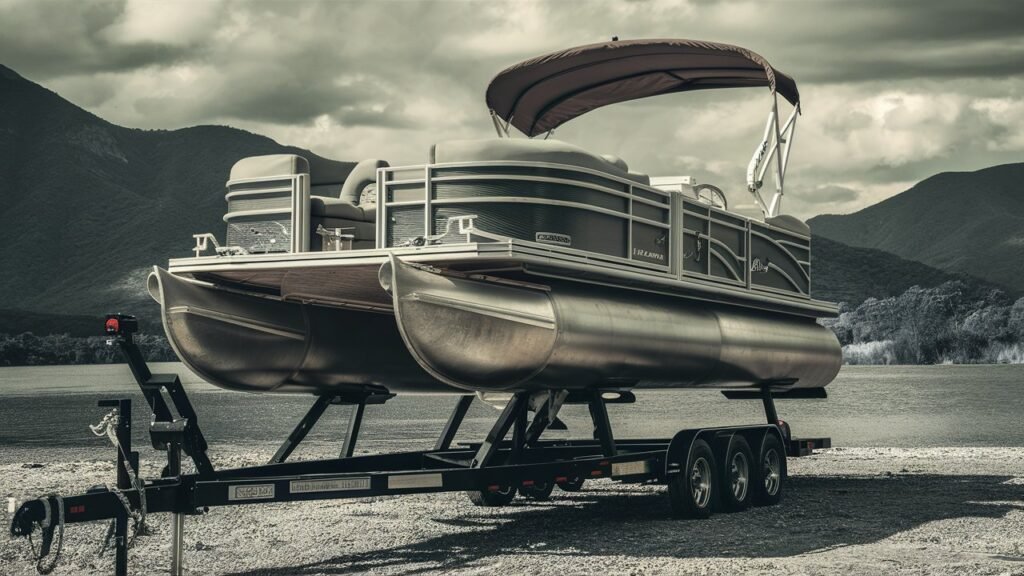
Okay, friend, so when preparing a boat for water adventures, you should ensure that it is in the right position on the trailer.
Do you agree with me that one wouldn’t want to drive down the road pulling alongside a twisted boat?
First and foremost, ascertain that the boat is centrally positioned on the trailer.
You don’t want it tilting too far to one side; it should sit straight.
The next thing to do is check out at those wheels.
Are they aligned with your boat? If not, then maybe you have to correct some alignment issues here and there.
When everything has been set well in accordance with each other – you’re all set!
Just make sure again before hitting a highway somewhere.
We can’t have your trailer flying off now can we?
Understanding the Importance of Trailer Tongue Weight
Now hear me out because this is crucial.
If you want to tow like a professional, you have to know what trailer tongue weight means.
In essence, it refers to the amount of weight pushing down on the hitch ball of your trailer.
If there’s too little tongue weight, the trailer will swing from side to side in an erratic manner; it’ll fishtail all over the place.
On the other hand, excessive tongue weight will cause your tow vehicle to squat deep down, straining under its load as it does so.
Find out what the recommended tongue weight for your particular trailer is and make sure you’re within that range.
Don’t hazard a random guess or else you risk not only your own life but also those around you.
Either consult that owner’s manual or go online and search for necessary details there.
Remember too – always check your trailer’s tongue weight on a regular basis!
Depending on how you load up your trailer, this value might change; thus stay vigilant in order to ensure safe and comfortable towing experience. You’ll be grateful.
CONCLUSION
In conclusion, understanding the height of a pontoon boat on a trailer is crucial for safe transport and storage.
Think about the dimensions of your vessel, the kind of trailer it needs and how much it weighs. Take into account any accessories or the winch stand when measuring the height of your boat on its trailer.
When selecting a trailer for your pontoon boat, think about its length, width and carrying capacity.
Various sizes of pontoons require different kinds of trailers: bunk trailers work well with larger pontoons whereas smaller ones are better suited by center lift trailers.
Verify alignment, winch strap security and lights/brakes to ensure safe fitment.
Lastly, be aware of what can happen if you don’t know anything about tongue weight while towing a trailer.
By following these guidelines, you’ll be able to transport and store your pontoon boat with confidence. Happy boating!
